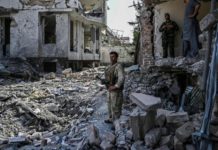We’re covering Russian airstrikes in western Ukraine and the difficulties France’s Green Party has faced in getting votes.
Russian airstrikes kill dozens in western Ukraine
Russia launched a barrage of airstrikes at a military base that had served as a hub for Western arms shipments near the Polish border, killing at least 35 people and wounding at least 134. Videos show the moment of the attack and the aftermath.
The base is just 12 miles from Poland, perilously close to where American troops are deployed, in a region of Ukraine that has been a safe haven. Ukrainian officials called the strike a “terrorist attack,” and renewed calls for NATO to establish a no-fly zone in the country.
Jake Sullivan, the U.S. national security adviser, said the airstrikes were a sign that Russian forces were expanding their targets in Ukraine because they were “frustrated by their lack of ability to take some of the major cities.”
Toll: The International Committee of the Red Cross warned that time was running out for hundreds of thousands of civilians still trapped in Mariupol, where more than 2,000 people have been killed. In a basement in Kyiv, Ukraine’s capital, nannies are keeping 19 surrogate babies alive.
Abducted: Ivan Fyodorov, the 33-year-old mayor of the southern Ukrainian city of Melitopol, encouraged defiance against the conquering Russian soldiers. He was then arrested, and hasn’t been heard from since.
Press casualties: Brent Renaud, an award-winning American filmmaker and journalist, was killed in Ukraine yesterday in Irpin, a suburb of Kyiv. He had contributed to The Times in recent years. His reporting partner, Juan Arredondo, was hospitalized.
Oligarchs: The war has finally led Britain to go after ultrawealthy Russians in London. U.S. officials believe a superyacht in an Italian dry dock may be associated with the Russian president, Vladimir Putin.
Stranded: Hundreds of planes owned by Western companies are still in Russia. They may never be recovered, forcing the companies to take on billions of dollars in losses.
Covid surges in the South Pacific islands
After escaping the coronavirus for a year and a half, New Caledonia, a French territory in the South Pacific, experienced a deadly outbreak last fall as the Delta variant swept through. Now, as the more recent Omicron surge eases, the virus’s disproportionate affect on the territory’s Indigenous population has become apparent.
While New Caledonia’s connections with France have led to state-of-the-art medical facilities to care for the infected, nearly all of the doctors are from abroad. Indigenous Kanaks also have high levels of obesity and diabetes, and low levels of income compared to the region’s European settlers, making it harder for them to live with the coronavirus.
New Caledonia is not alone. Fueled by the Omicron variant, the coronavirus is now reaching parts of the South Pacific that had avoided the pandemic for nearly two years. More than a thousand people have been infected in Tonga — a surge likely catalyzed by ships bringing aid supplies after a volcanic eruption and tsunami in January — while Kiribati and the Solomon Islands have contended with their own first outbreaks.
In other developments:
France’s Green Party struggles to inspire voters
Environmental concerns have grown increasingly prominent in France in recent years, marked by a series of marches and lawsuits, as well as by sweeping climate change legislation. Yet the political party advancing those issues most centrally has failed to garner many voters.
With less than 30 days to go before the first round of the presidential election, the Green Party’s candidate, Yannick Jadot, sits at around 5 percent in the polls. The run-up to the election has been dominated by issues like security, immigration and national identity, reflecting France’s recent shift to the right. Jadot is performing poorly with working-class voters, who fear the impact of the transition to clean energy on their livelihoods.
The French Greens, analysts say, have been unable to convince voters that they are a credible governmental force, capable of dealing with issues like diplomacy and defense, as is the case in Germany, where the Greens are now part of a three-party government coalition.
Media: Climate issues have accounted for just 2.5 percent of media coverage of the election in the past four weeks, according to a study released by several environmental groups.
THE LATEST NEWS
Asia and the Middle East
Hazel McCallion has been a force in Canadian politics for longer than just about anyone alive, despite starting her career in middle age. After playing pro hockey in the 1940s, “Hurricane Hazel” led Mississauga, Ontario, through epic growth until she left office at 93. At 101, her endorsements still matter.
ARTS AND IDEAS
Fresh eyes on an ancient site
It’s time to bring the 2,000-year-old city of Pompeii into the 21st century.
Gabriel Zuchtriegel, the site’s 40-year-old director, hopes that visitors will get a broader understanding of the ancient city — which was buried in ash by the eruption of Mount Vesuvius in A.D. 79 — including the roles of race, gender and class within its complex society. And he is using technology to try to shield the site from the ravages of climate change.
“We should not forget that all the wealth and art works that we see in Pompeii are really based on a society where not only slavery existed, but there was no concept of social welfare,” he said. Last year, archaeologists uncovered a grim room where they believed an enslaved family had lived — a cramped space that may have doubled as storage, lit by a single window.
Other experts have praised the approach, which is part of a broader shift in archaeology. “Oftentimes archaeologists can be conservative with the topics they address,” one historian said, adding, “I am psyched to see things starting to come around in Pompeii.”
PLAY, WATCH, EAT
What to Cook
Source : Nytimes













